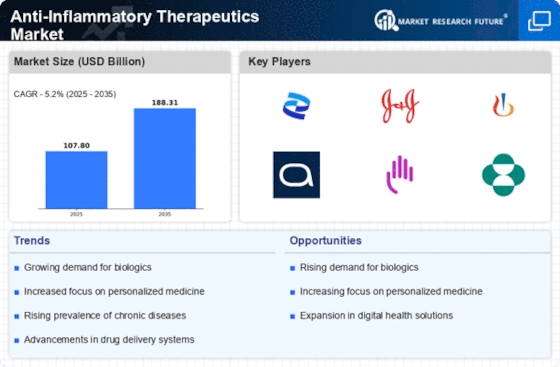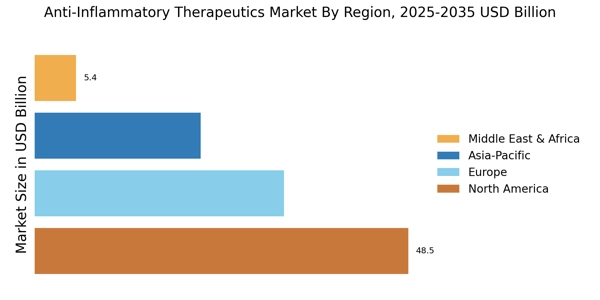Increasing Geriatric Population
The aging population is a significant driver of the Anti-Inflammatory Therapeutics Market. As individuals age, the likelihood of developing chronic inflammatory diseases increases, necessitating effective therapeutic interventions. The geriatric demographic is projected to grow substantially, with estimates indicating that by 2030, nearly 1 in 6 people will be aged 60 years or older. This demographic shift is expected to lead to a higher demand for anti-inflammatory treatments, as older adults often experience multiple comorbidities that exacerbate inflammatory conditions. Consequently, pharmaceutical companies are focusing on developing therapies specifically tailored to meet the needs of this population, further stimulating market growth.
Regulatory Support for Innovative Therapies
Regulatory bodies are increasingly supportive of innovative therapies in the Anti-Inflammatory Therapeutics Market. Initiatives aimed at expediting the approval process for new drugs, particularly biologics and biosimilars, are encouraging pharmaceutical companies to invest in research and development. The introduction of programs such as breakthrough therapy designations and fast track designations is facilitating quicker access to novel treatments for patients. This regulatory environment is likely to foster innovation, leading to a wider array of therapeutic options for inflammatory diseases. As a result, the market is expected to experience robust growth, with a diverse pipeline of products set to enter the market in the near future.
Advancements in Drug Development Technologies
Technological advancements in drug development are transforming the landscape of the Anti-Inflammatory Therapeutics Market. Innovations such as high-throughput screening, artificial intelligence, and biomarker identification are streamlining the drug discovery process. These technologies enable researchers to identify potential therapeutic candidates more efficiently, reducing the time and cost associated with bringing new drugs to market. Furthermore, the integration of personalized medicine approaches allows for tailored treatments that enhance efficacy and minimize adverse effects. As a result, the market is witnessing a surge in novel anti-inflammatory agents, with several new products expected to launch in the next few years, potentially reshaping treatment paradigms.
Rising Prevalence of Chronic Inflammatory Diseases
The increasing incidence of chronic inflammatory diseases such as rheumatoid arthritis, inflammatory bowel disease, and psoriasis is a primary driver of the Anti-Inflammatory Therapeutics Market. According to recent data, the prevalence of these conditions has been steadily rising, leading to a greater demand for effective therapeutic options. This trend is likely to continue, as lifestyle factors and environmental influences contribute to the growing burden of inflammation-related disorders. As a result, pharmaceutical companies are investing heavily in research and development to create innovative anti-inflammatory drugs. The market is projected to expand significantly, with estimates suggesting a compound annual growth rate (CAGR) of over 6% in the coming years, driven by the need for advanced treatment modalities.
Growing Awareness and Education on Inflammatory Conditions
There is a notable increase in awareness and education regarding inflammatory conditions, which is positively impacting the Anti-Inflammatory Therapeutics Market. Patients are becoming more informed about their health, leading to earlier diagnosis and treatment of inflammatory diseases. Healthcare providers are also emphasizing the importance of managing inflammation to prevent long-term complications. This heightened awareness is driving demand for anti-inflammatory therapies, as patients seek effective solutions to manage their conditions. Market data indicates that educational campaigns and patient advocacy initiatives are contributing to a more proactive approach to treatment, further propelling market growth.

















